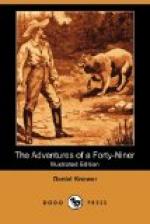Nothing of interest occurred until we got to the port of Acupulco, the largest place on the west coast of Mexico. We were about to enter the harbor when a government boat with officials came out and ordered us to stop. If we proceeded any further there would be “matter trouble” in broken English. There were Americans on shore who had crossed over from Vera Cruz for the purpose of taking this steamer. It would be a month before there would be another one, and then there would be no certainty of their getting aboard of that. The captain held a consultation of the passengers, who all decided to have them come on board. They were our countrymen and we would share our berths with them, although the vessel was then crowded, and some of the passengers volunteered to row ashore with the small boats to bring them aboard, which they did. When they approached the shore there was a company of soldiers waded in the water with pointed guns, forbidding them to approach any nearer. The Americans who were on the bank informed them that the soldiers would fire, and warning them not to approach any nearer, while bewailing their fate that they had to be left, so they returned. Then the captain received notice to leave in half an hour or the guns of the fort would open fire on us. It was a bright moonlight night. The fort was on a high knoll just above us, and could have blown us out of the water. So we thought discretion was the better part of valor, and we had to leave. The laws of nations were on their side. We were from an infected port, Panama, where cholera prevailed.
On board the steamer were some men of prominence. W.F. McCondery, from Boston, a retired East India sea captain, a man of wealth, who had been out of business for three years and craved for a more exciting life; who started the largest commission-house in San Francisco, and had consigned to him about all the shipments from Boston, and likewise the Prince de Joinville with my houses; Mr. G., from Liverpool, an Englishman, who had about all the consignments from that city; Rothschild’s nephew, who had represented that house as a banker in Valparaiso, Chili, was going to establish a branch of those great bankers’ house in San Francisco; Judge Terry, from Louisiana, who had the reputation at that time of being a dead shot with a pistol, who afterward challenged United States Senator Broderick to fight a duel, from political influences, and killed him, and some years afterward was assassinated himself from a disagreement with parties about a lawsuit. We came opposite Mazland at the mouth of the Gulf of California, and took on board some passengers and freight.
The next incident in our voyage was when we came in sight of San Diego, California, and saw the American flag floating from the flag staff. There was an instantaneous shout went up from every American on board. We were once more to be under its protection in our own country.
Love of country, mystic fire from heaven,
To light our race up to stateliest heights
’tis given.




